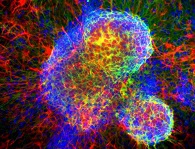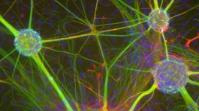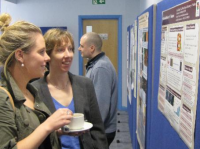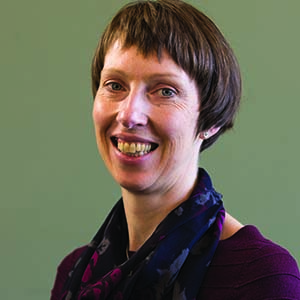Biography
Professor Fricker completed her BSc in Applied Biology at Bath University in 1991. From there she moved to Cambridge University to undertake a PhD, investigating factors affecting the survival and function of neural transplants for use in Parkinson’s disease (PD) and Huntington’s disease (HD). In 1995 she moved to the University of Lund, Sweden, to undertake a postdoctoral position, developing neural stem cells for transplantation in HD and PD. Then in 1998 she travelled to Harvard Medical School and spent two years investigating the potential of neural transplants in the cortex. Professor Fricker returned to the UK in 2000, and held a Wellcome Trust Career Development Fellowship with her research group based at Cardiff University.
In January 2005, Professor Fricker moved to Keele as a lecturer in the new Medical School and in the School of Life Sciences. She became a Senior Lecturer in 2008 and was promoted to Reader in 2012 and to Professor of Neurobiology in 2016.
In 2016 Prof. Fricker became Director of Medical Science at Keele Medical School, leading the team of 30 staff who deliver the science elements of the undergraduate programme in years 1-3, including: anatomy, biosciences, behavioural science and social science. She is also Research Lead for Biosciences in the Medical School.
Prof. Fricker is Principal Investigator of a research group within the Medical School / Institute for Science and Technology in Medicine at the University, and her research focuses on stem cell therapies for neurodegenerative diseases, in particular the role of vitamins in brain development and repair, and the bioengineering of neural circuits for therapeutics testing.
In the Medical School her former roles have included: Year 1 lead for Curriculum 2007, Theme lead for Doctor as a Scholar and Scientist Theme, and Deputy Chair of student Progress and Health and Conduct committees.
Research and scholarship
Medical School / ISTM Research theme: Regenerative Medicine
Research Interests:
1. Stem cell therapies for Parkinson’s disease
Professor Fricker’s group currently focuses enhancing the ability of immature stem/progenitor cells for neuronal differentiation and axonal growth, in vitro. They work primarily with neural stem cells and embryonic stem cells and their research aims to discover extrinsic factors that govern neuronal differentiation. Their goal is to derive dopaminergic neurons for the treatment of Parkinson’s disease, and GABAergic neurons for the treatment and investigation of Huntington’s disease.
Using state-of-the-art proteomics techniques they have identified novel signalling molecules that influence the development of midbrain dopaminergic neurons. With targeted studies, they aim to tease out to what extent these signals drive stem cell differentiation.
They are currently investigating the ability to define surface chemistries that provide controlled and enhanced differentiation of neural stem cells to dopamine neurons.

Blazing Neurons (Dr George Joseph) - Differentiated neural stem cells in vitro
2. The role of vitamins in neural development and brain repair
This research group’s current focus is the role of vitamins in neural development and brain repair. Their work on the vitamin D3 metabolite, calcitriol, shows that it is a key neuroprotective agent for dopamine neurons, acting through upregulation of glial derived neurotrophic factor (GDNF). Other work on the vitamin B3 metabolite, nicotinamide, has shown that this small signaling molecule is fundamental in driving stem cells towards a neural lineage and accelerating their development to yield higher numbers of neurons, specifically dopamine and serotonin neurons. They believe that both these vitamins hold potential for further exploration for clinical therapies for Parkinson’s disease. 
Nerve Superhighway (Dr Rowan Orme) - Dopamine neurons forming interconnected axonal pathways

Dr Síle Griffin at her prize-winning poster: The role of vitamin B3 in the conversion of stem cells to neurons
3. Generating neuronal circuitry in the cell culture dish to model neurodegeneration and test novel therapeutics.
In addition, in collaboration with Dr Paul Roach in ISTM, Professor Fricker’s group are developing a microfluidic device to allow them to re-create in vitro functional neuronal circuitries to serve as models of neurodegenerative disease. They are using chemical and topographical cues to fabricate biomaterial substrates that influence neuronal differentiation and direct axonal elongation; and they aim to generate stem cell-derived neuronal circuits that will serve as state-of-the-art models of neural degeneration, for the advancement of in vitro testing of emerging technologies in regenerative medicine.

Images from PhD student Matthew Dunn’s PhD thesis: Designing an integrated MEA-microfluidic device to produce an in vitro model of basal ganglia circuitry.
Former and current lab group members:
PIs and postdoctoral researchers:
Dr Stuart Jenkins
Dr Rowan Orme
Postgraduate students:
Emma Green
Matthew Dunn
Nana Efua Andoh
Atieme Ogbolosingha
George Joseph
Síle Griffin
Munyaradzi Kamudzandu
Rupert Wright
Yuting Zhang
Eunju (Jenny) Shin
Veejay Bagga
External Activities:
External to Keele, Professor Fricker has held the following responsibilities:
- Parkinson’s UK Research Advisory Panel member from 2009 – 2016.
- Editorial Board member of NeuroReport from 1999-2017 and Editor-in-Chief from 2012-14.
- Inaugural External Examiner for Bristol University’s Masters in Stem Cells and Regeneration degree programme 2010-13.
- Examiner for more than 15 PhD students either as an external examiner or internal to Keele.
- Supervisor in Keele’s EPSRC Centre for Doctoral Training in Regenerative Medicine, run in collaboration with Loughborough and Nottingham Universities.
Teaching
Keele Medical School:
2016 – 2019: Director of Medical Science:
Professor Fricker manages a diverse team of thirty academic staff who deliver the Medical Sciences components of the MBChB curriculum, mostly within years 1-3 of the course, including: the anatomy, biosciences, behavioural sciences and social sciences teams.
She oversees the delivery of all teaching and assessments by the team, chairs Year 1 and 2 Exam boards and is responsible for all recruitment and appraisal of members of her team and day-to-day staff and student issues.
Professor Fricker’s role includes Leadership of Biomedical Research in the team, managing the research budget and laboratory research space. She represents the School on Faculty Research Committee and Space Strategy task and finish group. She is also on the Medical School Senior Executive team, the Curriculum Review Group, Admissions and Assessments committees, Undergraduate Course committee, Budgeting and Finance group, Student Progress and Health and Conduct committees, Student-Staff Voices committee, Professional Development and Welfare committee.
2016 – date: Phase 1 lead for Curriculum 2018
Professor Fricker is leading the curriculum review for Phase 1 (years 1 and 2), to be rolled out in September 2018. She oversees the development of all course content, learning objectives, PBL cases, all types of learning activities, clinical placements, timetabling, and re-design of assessments, feedback and academic support.
Former roles in the Medical School:
- MBChB Theme Lead – Doctor as a Scholar and Scientist (2012-2016)
- MBChB 1st year Undergraduate Medical Degree Year 5 Scientific Lead (2012-2015)
- MBChB 1st year Undergraduate Medical Degree Year 1 Lead (2007-2012)
- MBChB Modules 1 and 2 (years 1 and 2)
Medical School teaching: PBL tutor, neuroanatomy tutor, lecturer, SSC supervisor
Life Sciences teaching (LSC):
- LSC-30028 Advances in Medicine
- LSC-30015 Biology of Disease
- LSC-30020 Neurobiology of Disease
- LSC-30021 Final Year Project for Neuroscience
- LSC-30023 Neuroscience Dissertation Projects
Research Team:
Current students:
Emma Green – (Primary supervisor: S. Jenkins). Project: The influence of nicotinamide on dopamine neurons and microglia in cellular models of neural development and Parkinson’s disease.
Nana Efua Andoh - (Primary supervisor: S. Chakravorty). Project: Molecular changes induced in endothelial cells by Plasmodium falciparum
Atieme Ogbolosingha - (Primary supervisor: S. Chakravorty). Project: Investigation of the effect of sequestration of Plasmodium falciparum infected red blood cells on endothelial cells and astrocytes of the blood brain barrier in cerebral malaria
Former PhD students/postdocs:
Matthew Dunn – Project: Optimisation of an in vitro microfluidic circuit to model Huntington’s and Parkinson’s diseases.
George Joseph (Primary supervisor: T Kyriakou). – Project: Computational methods to model neural stem cell responses to defined surface chemistries.
Munya Kamudzandu. Project: Fabrication of a microfluidic device to create functional basal ganglia circuitry in vitro.
Síle Griffin – Project: Directing stem cell differentiation towards a neuronal fate using nicotinamide.
Dr Rowan Orme - Projects: Identification of novel signaling molecules involved in the development of midbrain dopamine neurons. The role of calcitriol in the development and neuroprotection of midbrain dopamine neurons.
Rupert Wright (Primary supervisor: P. Roach). – Project: Driving the responses of neural stem cells using defined surface chemistries.
Eunju Shin – Project: Generation of functional GABAergic neurons from mouse embryonic stem cells for transplantation to a model of Huntington’s disease.
Veejay Bagga – Project: Manipulation of precursor cells for the replacement of complex circuitry lost in neurodegenerative disease.
Publications
School of Medicine
David Weatherall building
University Road
Keele University
Staffordshire
ST5 5BG
Tel: +44 (0) 1782 733937
Email: fmhs.facilities@keele.ac.uk
Admissions enquiries: enquiries@keele.ac.uk
The Clinical Education Centre
Keele University
Clinical Education Centre
University Hospitals of North Midlands NHS Trust
Newcastle Road
Stoke-on-Trent
Staffordshire
ST4 6QG
Email us: services.cecreception@keele.ac.uk
CEC general enquires: 01782 731876


